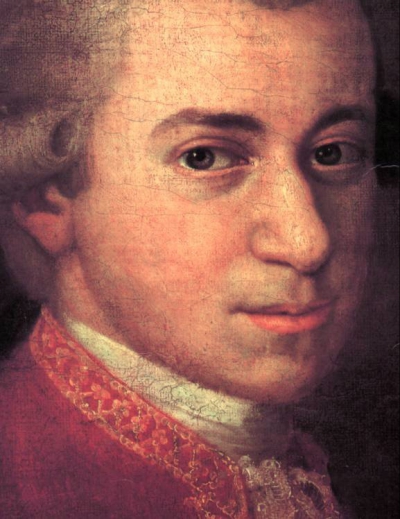Symphony No. 40 in G minor, K. 550 was written by Wolfgang Amadeus Mozart in 1788. It is sometimes referred to as the "Great G minor symphony", to distinguish it from the "Little G minor symphony", No. 25. The two are the only extant minor key symphonies Mozart wrote.
Wolfgang Amadeus Mozart (27 January 1756 – 5 December 1791), baptised as Joannes Chrysostomus Wolfgangus Theophilus Mozart, was a prolific and influential composer of the Classical period. Despite his short life, his rapid pace of composition resulted in more than 800 works of virtually every genre of his time. Many of these compositions are acknowledged as pinnacles of the symphonic, concertante, chamber, operatic, and choral repertoire. Mozart is among the greatest composers in the history of Western music, with music admired for its "melodic beauty, its formal elegance and its richness of harmony and texture".Born in Salzburg, in the Holy Roman Empire, Mozart showed prodigious ability from his earliest childhood. Already competent on keyboard and violin, he composed from the age of five and performed before European royalty. His father took him on a grand tour of Europe and then three trips to Italy. At 17, Mozart was engaged as a musician at the Salzburg court but grew restless and travelled in search of a better position.
While visiting Vienna in 1781, he was dismissed from his Salzburg position. He chose to stay in Vienna, where he achieved fame but little financial security. During his final years in Vienna, he composed many of his best-known symphonies, concertos, and operas, and portions of the Requiem, which was largely unfinished at the time of his early death at the age of 35. The circumstances of his death are largely uncertain and have thus been much mythologized.

1788Jul, 25
Wolfgang Amadeus Mozart completes his Symphony No. 40 in G minor (K550).
Choose Another Date
Events on 1788
- 18Jan
Botany Bay
The first elements of the First Fleet carrying 736 convicts from Great Britain to Australia arrive at Botany Bay. - 19Jan
Botany Bay
The second group of ships of the First Fleet arrive at Botany Bay. - 6Feb
United States Constitution
Massachusetts becomes the sixth state to ratify the United States Constitution. - 23May
United States Constitution
South Carolina ratifies the United States Constitution as the eighth American state. - 21Jun
Constitution of the United States
New Hampshire ratifies the Constitution of the United States and is admitted as the ninth state in the United States.

 English
English  español
español  français
français  português
português  русский
русский  العربية
العربية  简体中文
简体中文 